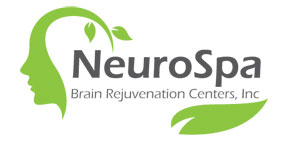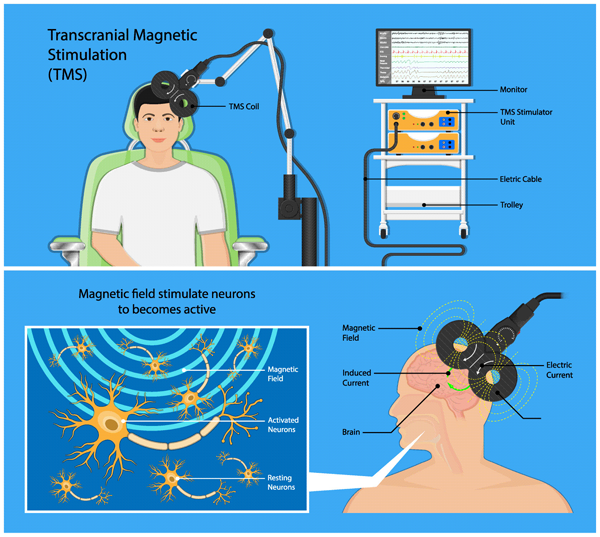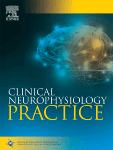What is Transcranial Magnetic Stimulation? Transcranial magnetic stimulation (TMS) is a significant technological breakthrough that is quickly replacing use of medications for non-pharmacological treatment of numerous neurological conditions including depression, anxiety, chronic pain, Parkinson’s, and stroke. TMS has been developed over the last nearly 30-40 years of research and development.
How does TMS work? TMS involves stimulation of any targeted regions of the brain using very small magnetic fields generated over specially-charged copper coils. By lightly stimulating specific group of brain cells, TMS increases blood flow, and can be used to either increase or decreased neuronal activity depending on the desired effect. In addition, studies show changes in neurotransmitter concentration in the areas both directly stimulated and regions that are within the network. Many brain disorders are due to either abnormally low or excessively high activity of brain cells. TMS can normalize activity in any chose region or network of brain cells.
What can TMS be used for and Why? TMS is an FDA-approved medical technology that achieves superior results when compared to traditional drugs. TMS bypasses all the systemic (kidney, liver, hormonal…etc) side-effects that are associated with many medications. Several large independent, multi-center, double blind randomized studies done in 2008 and 2010 have validated the efficacy and extreme safety of TMS in treatment of depression.
TMS is fast, safe, and effective. At our TMS Clinic, precise MRI and EEG data are used to both identify target locations of brain to significantly improve outcomes.
How Effective is TMS? TMS is extremely effective and far superior to most medications in treatment of several disorders (nearly three time as effective) including major depression and obsessive compulsive disorder (OCD). As an example, most studies show over 70% rate of improvement and nearly 50% rate of complete remission (‘Cure’) for depression with TMS while the rates of improvement with medications is between 7-30% at best and 7-18% remission.
Is TMS Safe? The magnetic field is very similar to MRI tests and carries absolutely no exposure to any contrast or radiation. TMS does not require any invasive procedures and is one of the safest medical treatments available.
What is process of TMS? The treatment begins at our TMS clinic with patient comfortably sitting or lying down in designated sofa/chair, followed by precise brain mapping using advanced navigational tools and algorithms to localize target areas for stimulation. During treatment, most feel a mild ‘buzzing’ sensation over the scalp. Technologically advanced devices used at our center also avoids the stiffness and discomfort associated with older technology that uses stereotaxic set-ups. Patients are far more mobile and head is less restricted. Patients can expect to feel significant improvement or, in some cases, complete resolution of their symptoms by end of treatment.
Find out more if you are interested in the scientific data and research for TMS.



